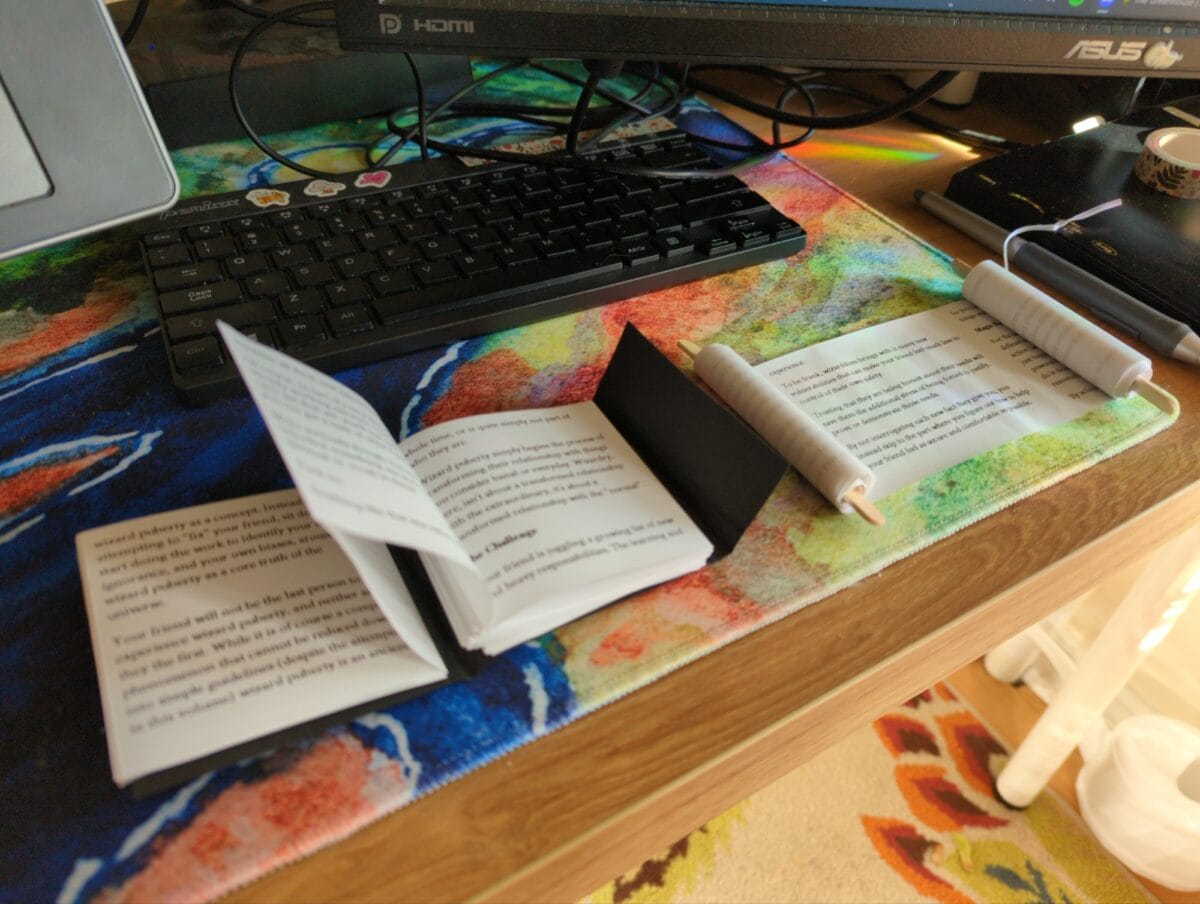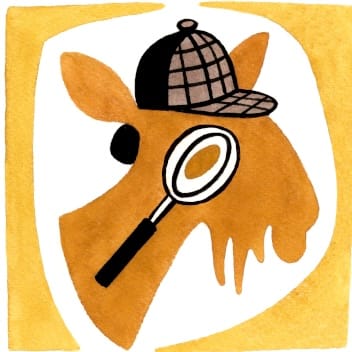Community roundup time! As I encounter things throughout my week, I toss them into this document to share with my beloved readers. These serve both to help you discover new things in the world, and to give snapshots of my week and where I have been.
Alyaza Birze — Cohost So White Postscript
[Y]ou might say to yourself: none of this is Cohost exclusive—and this is true. most of it is also worse elsewhere than it was on Cohost. but i expect this elsewhere and bake it all in; there's only so many times you can be told to kill yourself on Tumblr, or report someone on Twitter for calling you a n[...]r and watch them not get banned before that washes over you as a cost of doing business. [...]
but i didn't bake these in on Cohost because Cohost asked me to imagine that a better social media was possible (certainly for people like myself who are fatalistic about the internet)—and i did so. i had faith that if i did my job, staff would do theirs. sometimes this was true, and i'm glad it was. many times though, and for many people besides myself, it was not. is it our fault for having high expectations if someone sets those for us?
I was thinking reading Alyaza's postscript that my own writing on racism on Cohost was very focused on the network effect, but did not really describe at all what it meant to experience racism on Cohost. I sort of left "experience racism" as speaking for itself as inherently awful, and allowed Alyaza's essay I linked to to speak to the rest. But I think in some ways this way of writing it lacked empathy and was perhaps too distant from the emotional impact of what was being discussed. Minority stress causes both mental and physical health issues over the long-term. It is not merely a moral matter that we do not want people to be experiencing racism in our communities, there are also material consequences, with which all lives are intertwined.
Shel@soc.lizard.tools
The Website League is now live and open for users. My account is hosted by my sibling out-law Tom. I don't intend to say anything important on there that doesn't go here but it'll be a fun place to hang out I think. It is currently going through some growing pains, but I hope that my somewhat extensive oral history knowledge of social media development can be a resource to them as they figure out what they want to do.
Thermal paper scroll zine

The Other Shel is making zines out of thermal paper (AKA receipt paper) and I love them.
Psalm of the Invalids — Tyler Vile
I attended Rosh Hashanah at Hinenu in Baltimore this year. I sat next to Tyler Vile, one of the congregation's founding members. The story I was told is that Tyler was tired of being unable to fully participate in services because every synagogue had a raised bimah, meaning a wheelchair-user cannot approach the bimah for aliyah. Tyler set out to found a new synagogue, where Disabled people can fully participate, and the bimah would be wheelchair accessible.
It was incredible being in that space. I had never seen so many disabled people in a shul before, and especially never so many at the center, on the bimah, leading services. I was so used to us being told to be content sitting in the sidelines and 'symbolically' or 'spiritually' being included, but for it to be a given that we could not approach the bimah without pushing ourselves to do it without the accessibility aids we'd need to be fully present.
Everyone I met and spoke to openly had a disability, whether it be Ehlers-Danlos, ADHD, Long COVID, Dwarfism, scoliosis, and so forth. Everyone was fully there. A cantor with finger splints. A leyner with dyslexia. A cantor with forearm crutches. Tallitot redesigned to better fit smaller bodies and printed with gorgeous original artwork. Being handed a transcript of the dvar for help with auditory processing. A sensory break room. It was a community where disabled people were not just begrudgingly tolerated so long as we don't get in the way, but rather central to the community itself.
I cried so many times at the beauty.
So here is a poem I found, written by Tyler Vile, about Disability and Judaism, which really touched me. My disabilities can often fall into the "invisible" category, except that the mask makes me more visible now, and people do see the autism even if they don't know that's what they are seeing. But I just felt so seen and welcomed in a way no congregation had ever made me feel before.
JiSook Jung's Funky Clay Guys
I subscribed to Colossal on the recommendation of Only Know Nothing who had previously been a curator of wonderful found objects and images on Cohost.
Look at these guys. Wow! Incredible! So whimsical and evocative. Love it.
Haiku — Katherine Montalto
sadness
sticky like honey
can’t ever seem to clear it
stuck to everything
I love a good haiku. The addition of titles adds just slightest bit of extra information while retaining the short evocative pictures that come with a haiku. This one especially really touched me. Some might object to tweaking the format but I have done far more to the stretch the definition of haiku
What decided the SkyTrain line colors? — Cariad Heather Keigher
Wild to me that the Vancouver transit lines were colored based on partisan politics. Can you imagine if American cities avoided making transit lines red or blue? Or intentionally made something blue because the Democrats were pushing the funding through congress?
The Invention of Memory — Emily Dupree
I think most people stabilized their warped sense of time by other means. Instead of accepting that the pandemic continued on, that we failed to contain it and so would need to incorporate its ongoing reality into the stories we tell ourselves about our own lives, they instead transformed the fantasy of after into their reality. After the pandemic, after the lockdowns, after our world ruptured. They were able to interrupt the prolonged uncertainty that the pandemic had brought to all of our lives by erecting a finish line just in time for them to run through it. And as they ran through it, celebrating the fictional end of an arduous journey, they simultaneously invented a new before. This is the invention of memory.
The Pandemic became something temporally contained, its crisp boundaries providing a psychic safeguard to any lingering anxieties around the vulnerability and interdependence of our bodies that only a virus could show us. No longer did it threaten to erupt in their everyday lives, forcing cancellations and illnesses and deaths. It was, officially, part of The Past. And from the safety of hindsight (even if only an illusion), people began telling and re-telling the story of The Pandemic in ways that strayed from how it all actually went down. It was a way to use memory as self-soothing.
I found the article by way of Nex3 and found it very cathartic.
Exuviae — Formyths
I found this art piece to be very evocative.
Hunting cryptids with Frame 352 and a cheap thermal print camera — Curious Quail
It's thermal paper week apparently. This game looks so cute. I love the vibes going on here it really charmed me.
L'shanah tovah everyone
May you be inscribed and sealed in the book for life for a sweet new year. May you choose life over death whenever presented with the choice. May you find healing and hope in spite of how irrational it is to hope in this absurd chaotic world. The world is broken, but tzedakah, t'shuvah, and t'feillah make it easier to choose to live in this world again and again—each day as we rise up from sleep for yet another day of struggle.
Tzedakah is to try to help others and make the world whole even though it will never be enough. T'shuvah is to return to our better selves, to try and be better than we may have been, even though we will never stop having moments of weakness and failure. T'feillah is prayer, to direct our thoughts towards an irrational faith that things can be better in this world even as everything continues to fall apart. Somehow, our lives and the lives of those around us, somehow the world, will be transformed—despite all rational evidence to the contrary. We choose to believe it because that belief makes it easier to live. Because it motivates us to be kind and help others. Because it motivates us to try. Because it dissuades us from becoming martyrs or collaborators. Let us dream that we are all beautiful and whole.
Have a lovely week.
